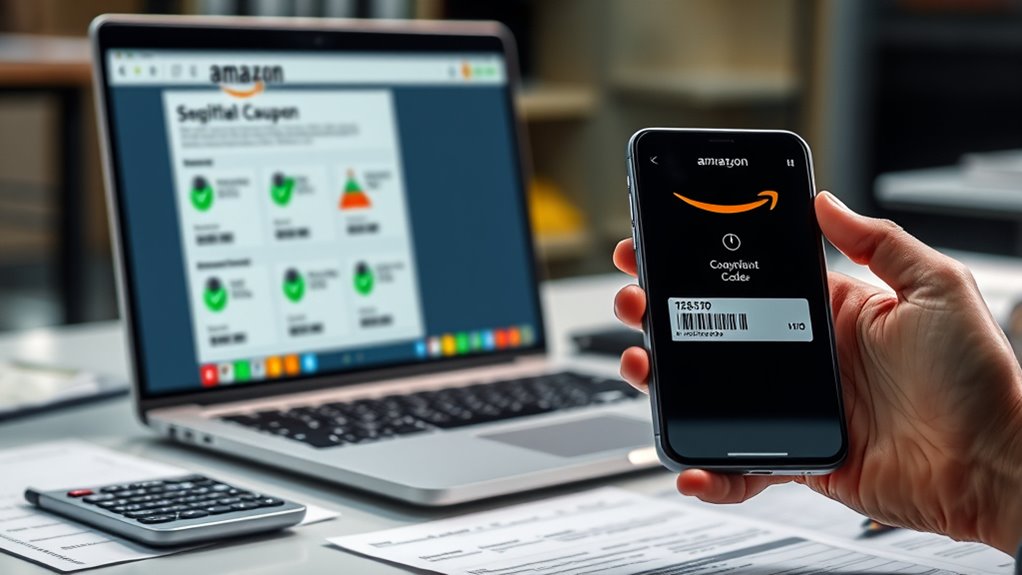Digital coupons generally aren’t taxable because sales tax is applied only to the amount you actually pay after discounts, including on Amazon. Amazon automatically calculates and collects sales tax based on the final price after these coupons, making compliance simpler for you. However, tax rules can vary by state, especially if a third party reimburses the coupon. To understand all the specifics and how they might affect your situation, keep exploring this topic further.
Key Takeaways
- Digital coupons reduce taxable sales price; sales tax is calculated on the net amount after discounts.
- Amazon automatically collects and remits sales tax based on the final price after applying digital coupons.
- The taxability of digital coupons may vary if a third party reimburses the discount, potentially making the original price taxable.
- Accurate record-keeping of digital coupon transactions is essential for compliance and tax reporting purposes.
- Tax laws and policies regarding digital coupons can differ by state, requiring sellers to stay informed of local regulations.

Are digital coupons taxable? If you’re shopping on Amazon or other e-commerce platforms, this is a question worth understanding. Digital coupons are discounts that reduce what you pay at checkout, often shown as a percentage off or a dollar amount. When it comes to sales tax, the general rule is that it’s applied to the net price after these digital coupons are deducted, not the original price you see before discounts. So, if you use a coupon that knocks $10 off a $50 item, the sales tax is calculated based on the $40 final price, not the original $50. This approach is common across many states, but keep in mind that tax treatment can vary depending on where you live. Some states might have specific rules, especially if a third party reimburses your coupon, which could mean the full original price becomes taxable again. The application of sales tax to discounted prices is a standard practice in most jurisdictions. Amazon, as a marketplace facilitator, takes responsibility for collecting and remitting sales tax on your purchases. It automatically calculates the tax based on your location and the final price you pay after all discounts, including digital coupons. This simplifies the process for you, as Amazon handles the compliance and guarantees the appropriate tax is added at checkout. Sellers on Amazon are required to set up their tax settings correctly in Seller Central, but they depend on Amazon’s system to manage the actual collection and remittance. Amazon also provides sellers with detailed reports and documentation, like 1099-K forms, that show gross sales and discounts applied, helping sellers stay compliant during tax season. Additionally, tax laws are continually evolving, so staying informed about current regulations can help prevent unexpected costs. Digital coupons are treated similarly to other types of discounts, such as percentage or dollar-off discounts, for tax purposes. All these discounts usually reduce the taxable base, meaning you’re taxed on the reduced amount you pay. However, if a coupon is reimbursed by a third party, some states might require sales tax to be applied on the original price instead, which complicates things a bit. As a seller or buyer, it’s essential to understand how your state handles these scenarios, especially if you operate across multiple states. Knowing the nexus, or the connection, you have to each state helps determine which rules apply. To stay compliant, keep thorough records of all digital coupon transactions. Amazon provides detailed sales reports and issues 1099-K forms, which document your gross sales and discounts. Maintaining accurate records is vital for audits and tax filings. Overall, in most cases, digital coupons reduce the amount you pay and, consequently, the sales tax, but the specifics can vary depending on your location and the nature of the coupon. Staying informed about your state’s rules will help guarantee you’re compliant and avoid surprises during tax time.
Frequently Asked Questions
Do Digital Coupons Affect Amazon Seller Taxes?
Digital coupons lower the final sale price you receive, which directly impacts your taxes. When customers use coupons, Amazon calculates sales tax based on the discounted amount, not the original price. This means you’ll report and pay tax on the reduced sales amount. Keep accurate records of coupon usage, as it affects your taxable revenue and deductions. Regularly review your tax settings in Seller Central to stay compliant with state laws.
Are There Regional Tax Differences for Digital Coupons?
Imagine digital coupons as keys opening different treasure chests across a map. Each region has its own rules about whether you pay taxes on the full treasure or just the amount after the key’s discount. You’ll find some states treat coupons as part of the price, while others see them as reimbursements. So, regional tax rules vary, and Amazon adjusts accordingly to guarantee you pay the correct amount wherever you shop.
How Do Digital Coupons Impact Sales Tax Reporting?
Digital coupons impact your sales tax reporting by reducing the taxable amount of each sale. When you apply a digital coupon, you lower the final sale price, which decreases the sales tax owed. You need to track whether coupons are store-issued or manufacturer-issued since this affects tax calculations. Accurate reporting requires adjusting the sale amount after coupons, ensuring compliance with state rules and avoiding potential tax liabilities.
Can Digital Coupons Be Taxed Differently for Business Accounts?
You wonder if digital coupons are taxed differently for your business account. Generally, the discount from a digital coupon reduces the sales price, and sales tax applies to that lower amount. However, if you’re enrolled in Amazon’s Tax Exemption Program and qualify, you might not pay sales tax on eligible purchases, regardless of coupons. Keep detailed records to guarantee proper tax treatment and compliance.
Are There Specific Tax Exemptions for Digital Coupons?
Think of digital coupons like hidden keys, opening savings but not always opening exemptions. You generally won’t find universal federal tax exemptions for digital coupons; instead, it depends on your state laws and retailer practices. Usually, if a discount reduces the retailer’s cash received, it’s excluded from taxable sales. Always check your state’s rules, as they vary, and understand whether third-party reimbursements impact your tax obligations.
Conclusion
Just like a river’s flow, the taxability of digital coupons can be unpredictable, winding through complex policies and regulations. While some coupons are taxable, others flow freely without adding to your tax bill. Staying informed is your compass, guiding you through this digital landscape. By understanding Amazon’s policies, you can navigate with confidence, avoiding hidden currents that might catch you off guard. Ultimately, knowledge keeps your financial ship steady amid the shifting tides of digital savings.









